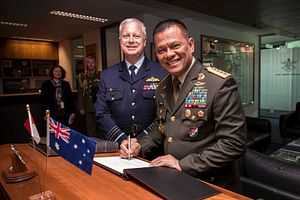The recent controversy in Australia-Indonesia military-to-military relations, while far less serious than was initially suggested, has nonetheless revealed the fragile nature of a deepening defense relationship between the two sides. As I had indicated in a previous piece, it would be a shame if an important relationship were to suffer setbacks due to such controversies (See: “Indonesia-Australia Military Relations Hit Another Snag”).
But what’s so significant about preserving the Australia-Indonesia military relationship, anyway? The question may seem overly broad and should be rather obvious to supporters of closer bilateral ties. Nonetheless, it is important to lay out the importance of this relationship clearly in order to fully grasp why some are so interested in seeing it maintained and strengthened in spite of occasional controversies like this one.
Preserving the Australia-Indonesia military relationship in spite of controversies like this recent one is significant for three reasons. First, Australia and Indonesia, despite being two neighboring, significant, and highly-capable actors in the Indo-Pacific, have had a turbulent relationship historically speaking, and improving security ties is a way to help improve the overall ties.
The recent controversy is just the latest in a series of crises that have periodically rocked relations between Jakarta and Canberra for almost seventy years. Though the specific issues themselves run the gamut, those that are perceived to relate to interference into Indonesia’s sovereignty and territorial integrity have tended to spark the most outrage, whether it be disagreements over East Timor in 1999 or the 2013 revelations that Australia had been tapping the phone of then-Indonesian President Susilo Bambang Yudhoyono.
To be sure, these sensitivities are sometimes overhyped, as this latest controversy has arguably proven (See: “Old Shadows in New Australia-Indonesia Military Spat”). But these tensions have nonetheless dealt blows to the relationship, at times even to the point of rupture.
In spite of occasional tensions and crises, it is also true that both countries have increasingly grown to appreciate the significance of the other and understand that a broader and deeper overall relationship, including in the defense realm, can help build the confidence for better ties. For instance, in Australia’s 2016 Defense White Paper, what was interesting was not the fact that Indonesia was characterized as “vital,” (Canberra has long been assailed by naysayers who claim that this sort of praise sets unrealistically high expectations for ties), but rather that this vitality was viewed as being based not just its traditional geostrategic importance, but also its growing potential in the economic, diplomatic, and military realms as well.
Second and more specifically, preserving bilateral defense ties is additionally significant because of the inroads that have already been made in recent years in spite of this prickly past. Over the past decade, the two countries have taken some significant steps to strengthen the architecture of their military relationship to institutionalize and regularize interactions at the highest levels, thereby promoting trust and better insulating ties against further downturns.
In 2006, Australia and Indonesia signed the Lombok Treaty, which established a framework to govern security cooperation between the two countries. That was an important step to take, especially since a 1995 security agreement concluded by the both sides had been torn up by Indonesia during the 1999 East Timor crisis. In 2012, both sides also inked a defense cooperation agreement and launched a two-plus-two dialogue between their foreign and defense ministers. The “2+2” meeting has since gone through four iterations, with the last one occurring in late October 2016.
Taken together, these constitute important steps for Indonesia and Australia to take on the security side. Indeed, before this latest controversy, it was common to hear officials refer to defense relations between the two countries as being the best it has ever been since the East Timor crisis in 1999.
Third and finally, sustaining the momentum of Australia-Indonesia military relations is critical because the collaboration has significant impacts not only for these two countries, but for the region and the world more generally. As Australia’s then-defense minister Dennis Richardson said in an interview in Indonesia back in May 2013, “the interesting thing…is that this is now a relationship that is not just about bilateral issues, but a relationship that embraces regional and global issues.”
That’s not just rhetoric. If you look at the defense relationship, it is certainly true that the speed, scale and scope of bilateral ties have been growing over the past few years. There has been plenty of promise not only in not only in traditional areas like maritime security, but also in newer ones like cyber and even defense industry collaboration, even though these are still in the early stages (See: “Indonesia-Australia Defense Relations in the Spotlight”).
Nonetheless, it is beyond doubt that regional and global issues have become a bigger part of Australia-Indonesia military relations as well. Countering terrorism financing is a good example of this, even though, as I have noted previously, it does not get the attention it deserves. Both sides co-hosted the inaugural Asia-Pacific Counterterrorism Financing Summit back in 2015, and they have developed a regional risk assessment on terrorism financing in Southeast Asia – the world’s first. But there are other examples in other areas too, including peacekeeping.
When Indonesia’s Defense Minister Ryamizard Ryacudu this week warned rather bluntly against letting “insignificant rats disrupt the relationship” between Indonesia and Australia following the controversy and emphasizing that he will probably be making a trip soon to smooth things over, most focused on the fact that he was downplaying the latest incident. But his remarks, along with those of his counterpart Marise Payne as well as the leaders of both countries, were also testament to the clear significance of this growing defense relationship. A look at where ties are today vindicates that belief.































